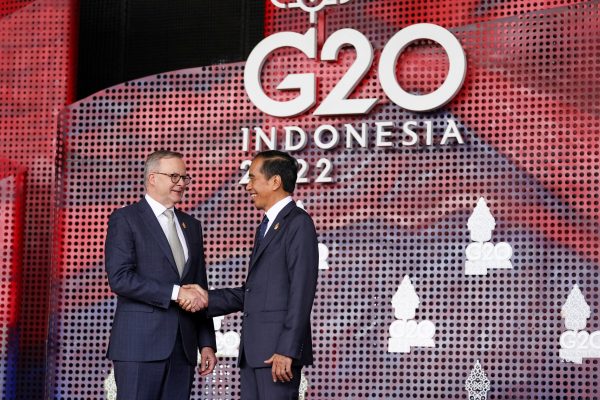Widodo will arrive in an Australia that is under new political management. His presidency has overlapped with a long period of government led by the conservative Liberal–National coalition, which ended with the election of Prime Minister Anthony Albanese’s centre-left Labor Party in May 2022.
Under Albanese, Australia is pushing a more progressive domestic policy program while Foreign Minister Penny Wong attempts to square Canberra’s close political and security relationship with the United States towards an agenda that recognises Australia’s deep enmeshment with Asia, which was the hallmark of Labor governments in the 1980s and 1990s.
Joko Widodo likewise cuts a different figure nine years into his presidency than when he came to office in 2014. He has more political authority at home, thanks to his strong economic record as well as his hardball dealings with opponents, and has embraced a more hands-on role in foreign affairs in the twilight of his presidency that has delivered Indonesia a new international standing.
Indonesia’s policies still reflect the fragmentation and political contestation that characterise all areas of policymaking. Yet with a successful G20 presidency under its belt and chairmanship of ASEAN in hand, a new-found centrality in the critical minerals trade and its strategically important geography, the time seems to be ticking on the cliché that Indonesia punches below its weight on the international stage.
Despite all these changes, the conversation about the Indonesia–Australia relationship is stuck in examining the unmet opportunities of bilateral ties that, while certainly real, divert attention from the potential for both countries to work together to shape the region’s future in ways that protect not only their shared interests, but those of other small and middle powers throughout Asia and the Pacific.
In this week’s lead article, Peter Drysdale and Rizal Sukma argue that as Widodo lands in Australia, ‘the ambition of both countries should be no less than to reframe the bilateral relationship into an effective global partnership’, marked by ‘a better integrated strategy in pursuing their common domestic and international policy priorities’ through regional and global multilateral bodies.
Such cooperation would focus principally on the challenges both countries share as commodity-exporting middle powers who are deeply integrated with the Chinese economy through trade and investment ties, yet wary of overdependence on one market, and who face disruption to both their economically-important fossil fuel industries from the energy transition required to address climate change as well as from the weakening of the multilateral trade system.
Faced with these challenges, Drysdale and Sukma say Australia and Indonesia ‘should revitalise collaboration in international economic forums, identifying common actions and initiatives to shape regional and global governance reforms’ using the platforms provided by the ‘flagship Indonesia–Australia Comprehensive Economic Partnership Agreement, Regional Comprehensive Economic Partnership agreement and the ASEAN–Australia–New Zealand Free Trade Agreement’.
Through heightened appreciation of their shared international economic interests, a convergence in strategic outlooks might slowly emerge. For the time being, Australian and Indonesian elites will only partially see eye-to-eye on security questions, particularly with regard to their assessments of China, though that could change.
To some Australians, Indonesia’s reluctance to openly confront China on its envelope-pushing in the South China Sea and its silence on human rights issues reflect a complacent, transactional attitude towards China that Australia has grown out of. To many Indonesians, theirs is a pragmatic approach that lets sleeping dogs lie — something Australia might well learn from as it sleepwalks into a containment strategy with the United States that most Southeast Asian governments feel is immensely destabilising to the region.
Achieving the kind of relationship that Drysdale and Sukma propose will require changes in both countries: in Indonesia, it means walking the talk on rules-based trade, moving away from the export bans and barriers to imports that are still reflexively used to cope with the vicissitudes of global markets.
For Australia it will mean thinking of Indonesia as a country that matters not just as a distant potential market for Australian exporters, a shield against China or a charity case for the Australian aid program, but rather as a global player whose role in international affairs will dwarf Australia’s as its economy grows to be one of the world’s biggest. It also means accepting the reality that the calculus of benefits and risks of deepening engagement with China look very different to a middle-income country with Indonesia’s development challenges.
Even as the cultural gulf between the two countries grows amid the conservative trends in Indonesian politics and society, Australian leaders must explain to the Australian public why the relationship with Indonesia is bigger than the bilateral — that it is central to the ambition of finding Australia’s security among its Asian partners to build a regional and global system where the interests and autonomy of small and middle powers are safeguarded on a multipolar distribution of strategic power.
The EAF Editorial Board is located in the Crawford School of Public Policy, College of Asia and the Pacific, The Australian National University.

